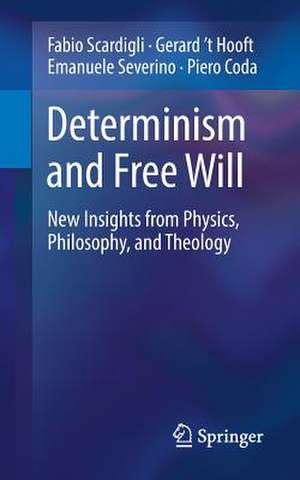Determinism and Free Will: New Insights from Physics, Philosophy, and Theology
Autor Fabio Scardigli, Gerard 't Hooft, Emanuele Severino, Piero Codaen Limba Engleză Paperback – 5 feb 2019
Preț: 528.80 lei
Preț vechi: 622.11 lei
-15% Nou
Puncte Express: 793
Preț estimativ în valută:
101.19€ • 108.20$ • 84.37£
101.19€ • 108.20$ • 84.37£
Carte tipărită la comandă
Livrare economică 17 aprilie-01 mai
Preluare comenzi: 021 569.72.76
Specificații
ISBN-13: 9783030055042
ISBN-10: 3030055043
Pagini: 110
Ilustrații: VI, 119 p. 1 illus.
Dimensiuni: 127 x 203 x 12 mm
Greutate: 0.45 kg
Ediția:1st ed. 2019
Editura: Springer International Publishing
Colecția Springer
Locul publicării:Cham, Switzerland
ISBN-10: 3030055043
Pagini: 110
Ilustrații: VI, 119 p. 1 illus.
Dimensiuni: 127 x 203 x 12 mm
Greutate: 0.45 kg
Ediția:1st ed. 2019
Editura: Springer International Publishing
Colecția Springer
Locul publicării:Cham, Switzerland
Cuprins
Introduction (Fabio Scardigli).- Free Will in the Theory of Everything (Gerard 't Hooft).- Phenomenology, Freedom, Causality, and the Origin of Western Civilization (Emanuele Severino).- Grace, Freedom, Relation (Piero Coda).
Notă biografică
Gerard 't Hooft, Nobel Prize in Physics 1999, has contributed to major developments in fundamental theoretical physics in the last forty years. He is known, among many things, for his research on quantum chromodynamics, for the introduction of the holographic principle in quantum gravity. And, not least, for his controversial deterministic interpretation of quantum mechanics.
Emanuele Severino, Academician of Lincei, is one of the foremost theoretical philosophers of our time. His interpretation of Becoming, which seems to challenge common sense, leads to a surprising vision of the world and of history. He is well known to the general public in Italy, both for his philosophical essays and for his interventions on the central themes of contemporary life.Piero Coda, philosopher and theologian, was Prelate Secretary of the Pontifical Academy of Theology, and Professor of the Pontifical Lateran University. In 2014 he was nominated by Pope Francis as a memberof the International Theological Commission. Currently he is Dean of the Sophia University Institute of Incisa Val d'Arno (Firenze).
Fabio Scardigli is a theoretical physicist affiliated with the Mathematics Department at the Polytechnic University of Milan and the Institute Lorentz for Theoretical Physics at Leiden University. His research focuses on the (quantum) physics of black holes and on the generalized uncertainty principle.
Emanuele Severino, Academician of Lincei, is one of the foremost theoretical philosophers of our time. His interpretation of Becoming, which seems to challenge common sense, leads to a surprising vision of the world and of history. He is well known to the general public in Italy, both for his philosophical essays and for his interventions on the central themes of contemporary life.Piero Coda, philosopher and theologian, was Prelate Secretary of the Pontifical Academy of Theology, and Professor of the Pontifical Lateran University. In 2014 he was nominated by Pope Francis as a memberof the International Theological Commission. Currently he is Dean of the Sophia University Institute of Incisa Val d'Arno (Firenze).
Fabio Scardigli is a theoretical physicist affiliated with the Mathematics Department at the Polytechnic University of Milan and the Institute Lorentz for Theoretical Physics at Leiden University. His research focuses on the (quantum) physics of black holes and on the generalized uncertainty principle.
Textul de pe ultima copertă
In this small book, theoretical physicist Gerard 't Hooft (Nobel prize 1999), philosopher Emanuele Severino (Lincei Academician), and theologian Piero Coda (Pontifical Lateran University) confront one another on a topic that lies at the roots of quantum mechanics and at the origin of Western thought: Determinism and Free Will. "God does not play dice" said Einstein, a tenacious determinist. Quantum Mechanics and its clash with General Relativity have reanimated ancient dilemmas about chance and necessity: Is Nature deterministic? Is Man free? The “free-will theorem” by Conway and Kochen, and the deterministic interpretation of quantum mechanics proposed by 't Hooft, revive such philosophical questions in modern Physics. Is Becoming real? Is the Elementary Event a product of the Case? The cyclopean clash between Heraclitus and Parmenides has entered a new episode, as evidenced by the essays in this volume.
Caracteristici
A concise exploration of one of philosophy's oldest debates Presents the positions of three eminent scholars from physics, philosophy and theology Includes a substantial introduction to set the scene as well as new ideas to fire the debate
